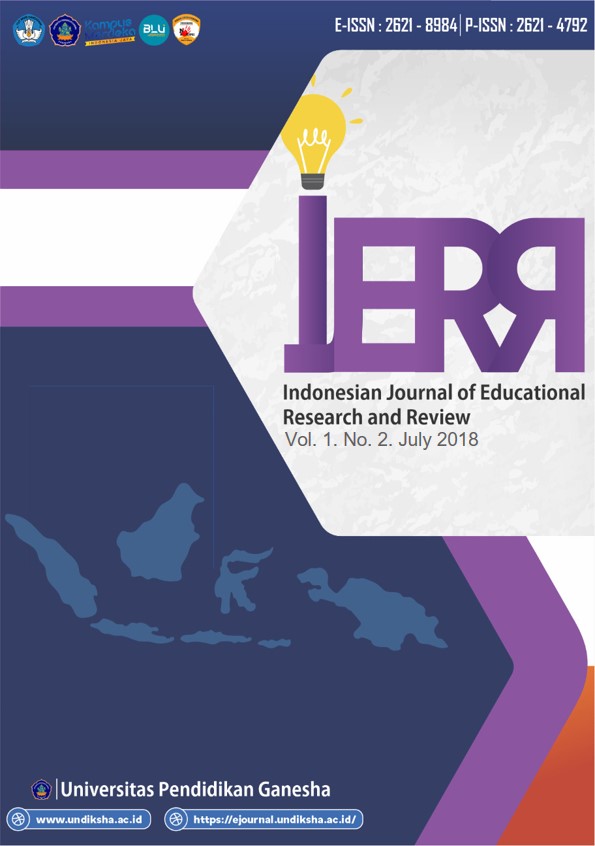HUBUNGAN ANTARA KESIAPAN BELAJAR DENGAN KOMPETENSI INTI PENGETAHUAN BAHASA INDONESIA PADA SISWA KELAS V SD GUGUS LETKOL WISNU DENPASAR UTARA TAHUN PELAJARAN 2017/2018
DOI:
https://doi.org/10.23887/ijerr.v1i2.14713Abstract
This study was intended to determine the relationship between the readiness of learning with the core competence of Indonesian language knowledge of the V grade students of SD Gugus Letkol Wisnu North Denpasar in Academic Year 2017/2018. The type of this research was ex post facto research with asymmetric correlation. The population of this study was all students of V grade students which located at SD Gugus Letkol Wisnu North Denpasar in Academic Year 2017/2018 which has population of 340 students. The determination of the sample used proportional random sampling technique with 5% error rate and obtained many samples from the population were 172 students. The data which obtained through the results of the questionnaires about the readiness of learning and the core competence of Indonesian language knowledge were obtained from recording documents value of the end semester of the core competence of Indonesian language knowledge of the V grade students of SD Gugus Letkol Wisnu North Denpasar in semester 1. As the test was a normality test data distribution. After all the prerequisite tests were fulfilled, statistical analysis used in this research was hypothesis test which used product moment correlation analysis. Based on the results of the analysis, then rxy count = 0.818. At the significance level of 5% with n = 172, then obtained rxy table = 0,148.It could be stated that rxy count = 0,818> rxy table = 0,148, hence it can be interpreted that H0 which reads there was no significant correlation between the readiness of learning with core competence of Indonesian language knowledge of the V grade students of SD Gugus Letkol Wisnu North Denpasar rejected this mean Ha accepted. Therefore, it can be concluded that there was a significant relationship between the readiness of learning with the core competence of Indonesian language knowledge of the V grade students of SD Gugus Letkol Wisnu North Denpasar in Academic Year 2017/2018, with a positive correlation direction, it means the higher the readiness of learning so that the higher the core competence of Indonesian language knowledge.References
Agung, A.A.Gede. 2012. Metodologi Penelitian Pendidikan. Singaraja: Universitas Pendidikan Ganesha.
Agung, A.A.Gede. 2016. Statistik Dasar untuk Pendidikan. Yogyakarta: deepublish.
Akhadiah, Sabarti, dkk. 1991. Bahasa Indonesia I. Jakarta: Proyek Pembinaan Tenaga Kependidikan.
Arikunto, Suharsini. 2010.Prosedur Penelitian Suatu Pendekatan Praktik. Jakarta: PT. Rineka Cipta.
BSNP. 2006. Panduan Penyusunan KTSP Jenjang Pendidikan Dasar dan Menengah. Jakarta: BSNP
Budiman, Hendra. 2017. Hubungan antara Kesiapan Belajar dengan Prestasi Siswa SMK, Volume 4, Nomor1..
Dantes, N. 2017.Desain Experimen dan Analisis Data. Depok: Rajawali Pers.
Degeng, I Nyoman Sudana. 1998. Mencari Paradigma Baru Pemecahan Masalah Belajar. Malang: Departemen Pendidikan dan Kebudayaan Institut Keguruan dan Ilmu Pendidikan Malang
Djamarah, Syaiful Bahri. 2011. Psikologi Belajar. Jakarta: Rineka Cipta.
Emzir. 2011. Metodelogi Penelitian Pendidikan. Jakarta: Rajawali Pers.
Hamalik, Oemar. 2013. Kurikulum dan Pembelajaran. Jakarta: Bumi Aksara.
Kosasih, E. 2014.Strategi Belajar dan Pembelajaran Implementasi Kurikulum 2013. Bandung: Yrama Widya.
Koyan, I Wayan.2012. Statistik Teknik Analisis Data Kuantitatif. Singaraja: Universitas Pendidikan Ganesha.
Mulyani, Dessy.2013. Hubungan Kesiapan Belajar Siswa dengan Prestasi Belajar, Volume 2, Nomor 1 (hal. 27-31).
Mursyidun Nidhom, Ahmad. 2015. Hubungan Kesiapan Belajar, Lama Pembelajaran, Kesesuaian Tempat Dan Partisipasi Du/Di Dengan Hasil Prakerin Peserta Didik Kompetensi Keahlian Tkj Di Smk Kota Batu. Volume 11, Nomor 1 (hal. 1-14).
Musfiquon. 2012. Metodelogi Penelitian Pendidikan. Jakarta: PT. Prestasi Pustakaarya.
Netra, I.B. Statistik Inferensial. 1974. Surabaya: Usaha Nasional
Permendikbud.2014. Peraturan Menteri Pendidikan dan Kebudayaan Republik Indonesia Nomor 103 tahun 2014 Tentang Implementasi Kurikulum. Jakarta: Kementerian Pendidikan dan Kebudayaan.
Permendikbud.2015. Peraturan Menteri Pendidikan dan Kebudayaan Republik Indonesia Nomor 103 tahun 2015 Tentang Implementasi Kurikulum. Jakarta: Kementerian Pendidikan dan Kebudayaan.
Sanjaya, Wina. 2013.Penelitian Pendidikan. Jakarta: Kencana.
Setyosari, H. Punaji. 2015. Metodelogi Pendidikan dan Pengembangan. Jakarta: Kencana.
Sinta B, Vivo. 2017. Pengaruh Kesiapan Belajar Terhadap Hasil Belajar Mata Pelajaran Ekonomi Kelas X Di Sma Bina Jaya Palembang.Volume 1, Nomor 1 (hal. 11-20).
Siregar, Syofian. 2015. Statistika Terapan. Jakarta: Prenadamedia Group.
Slameto. 2010. Belajar dan Fakor-Faktor Yang Mempengaruhinya.Jakarta: Rineka Cipta
Sudijono, Anas. 2005. Pengantar Evaluasi Pendidikan. Jakarta: PT Raja Grafindo Persada.
Sugiyon. 2010. Statistik untuk Penelitian. Bandung: Alfabeta.
Sugiyono. 2012a. Metode Penelitian Kuantitatif, Kualitatif Dan R&D. Bandung: Alfabea
Sugiyono.2012b. Statistik untuk Pendidikan. Bandung: Alfabeta Bandung.
Sugiyono. 2013. Metodologi Penelitian Pendidikan. Bandung: Alfabeta.
Sugiyono. 2014. Metodologi Penelitian Pendidikan. Bandung: Alfabeta.
Sukardi.2012. Metodologi Penelitian Pendidikan. Jakarta: PT. Bumi Aksara
Supardi.2016. Aplikasi Statistika dalam Penelitian. Jakarta Selatan: Change Publication.
Susanto, Ahmad. 2013. Teori Belajar dan Pembelajaran di Sekolah Dasar. Jakarta: Kencana Prenada Media Group.
Suviana, Novita Tyas. 2012. Hubungan Kausal antara Motivasi Internal dan Kesiapan Belajar Kognitif pada Mata Pelajaran Biologi di SMA Negeri 1 Cawas Tahun Pelajaran 2011/2012, Volume 1, Nomor 1 (hal. 18-27).
Undang-undang Republik Indonesia no.20 Tahun 2003 tentang Sistem Pendidikan Nasional, 1990. Jakarta: PT. Arnas Duta Jaya.
Wirasunu, Tulus 2006.Statistik dalam Penelitian Psikologi dan Pendidikan. Malang: UMM Press.
Downloads
Published
How to Cite
Issue
Section
License
Authors who publish with the Indonesian Journal of Educational Research and Review (IJERR) agree to the following terms:
- Authors retain copyright and grant the journal the right of first publication with the work simultaneously licensed under a Creative Commons Attribution-ShareAlike 4.0 International License. that allows others to share the work with an acknowledgment of the work's authorship and initial publication in this journal.
- Authors are able to enter into separate, additional contractual arrangements for the non-exclusive distribution of the journal's published version of the work (e.g., post it to an institutional repository or publish it in a book), with an acknowledgment of its initial publication in this journal.
- Authors are permitted and encouraged to post their work online (e.g., in institutional repositories or on their website) prior to and during the submission process, as it can lead to productive exchanges, as well as earlier and greater citation of published work. (See The Effect of Open Access)









